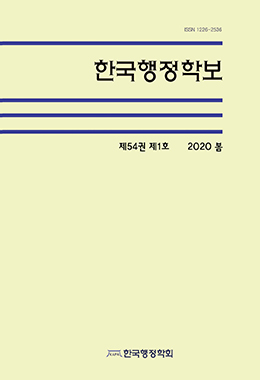본 연구는 행정이 추구하는 가치들의 관계를 탐색적으로 분석한 연구이다. 이를 위해 공공기관 경영평가제도의 목적에 배태된 행정에서의 가치를 관리적 가치(효과성, 고객지향성, 효율성)와 정치적 가치(사회적 형평성)로 구분하고, 이들의 관계를 탐색적으로 매개된 조절효과 모형을 적용해 분석하였다. 연구모형은 공공기관 경영평가 목적을 고려하여 독립변수를 효율성(업무효율), 종속변수를 고객지향성(국민평가)으로, 매개변수를 효과성(주요사업)으로, 조절변수를 사회적 형평성(정부권장정책)으로 설정했다. 분석결과, 부분 매개된 조절효과모형임을 확인할 수 있었다. 효율성이 고객지향성에 미치는 영향에서 효과성의 매개효과는 사회적 형평성이 평균수준일 때 발생하며, 사회적 형평성 수준에 따라서 효율성이 고객지향성에 미치는 영향이 다르다는 것을 알 수 있었다. 본 연구는 효율성, 효과성, 고객지향성이라는 관리적 가치간의 관계에 사회적 형평성이라는 정치적 가치가 미치는 영향을 분석한 결과를 토대로, 공공가치 창출은 행정가치들 간의 균형과 조화가 이루어 질 때 가능하다는 것을 실증적으로 검증한 연구이다. 이러한 연구결과를 통해서 본 연구는 행정가치간의 균형과 조화를 달성하도록 하는 것이 행정이 가져야할 정체성이며 궁극적인 역할임을 제시한다.
This study investigates the relationship among public administrative value, which should be pursued by political context. To this end, this study divides administrative value assigned to the purpose of public institutions' management evaluation system into two types: public administrative value (effectiveness, customer orientation, efficiency) and political value (social equity). The model was tested by conditional process analysis. The research model considers the objectives of public institution management evaluation as an independent variable for efficiency, a dependent variable for customer orientation, a mediated variable for effectiveness, and a moderated variable for social equity. The research model statistically proved as a mediated moderating model. This study found efficiency has impacts on customer orientation with a mediating effect of effectiveness, which occurs when social equity is at an average level. This study also found that the effect of efficiency on customer orientation differs according to the level of social equity. The results of this study empirically support the conclusion that creating public value would seem to be possible when balance and harmony between administrative value could be achieved.


